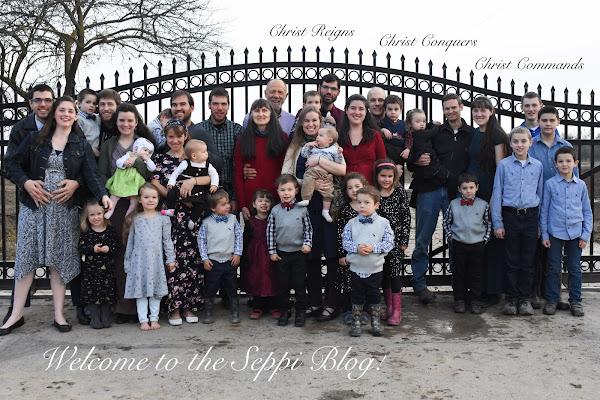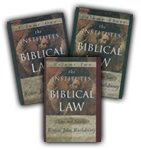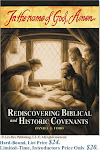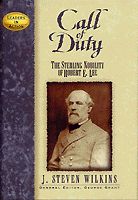Monday, September 23, 2013
Guest Post: The Unity of the Abrahamic and Mosaic Covenants by Peter B.
There seems to be a tendency among Christians today to oppose parts of the Bible against each other. This is often the case when dealing with the relation between the Old and New Testaments. Another place this happens is in dealing with the relation between God’s covenant with Abraham and His covenant with Israel under Moses. Some will say that the covenant at Sinai was a case of “free grace exchanged for law” and that “The Abrahamic covenant had ministered salvation and assurance because it imposed only one condition – faith. This the legal [i.e. Mosaic] covenant could not do.” (Unger, 78) Was the Mosaic covenant a return to works-based righteousness? Was it a break with the grace of God’s covenant with Abraham? Or was the Mosaic covenant a grand expansion of God’s promises to Abraham? As we look at the nature of the covenants with Abraham and Israel we find that they are not contrary to each other, but are two expressions of God’s redemptive covenant of grace, the one built upon the other.
The basis for both the Abrahamic and Mosaic covenants is the same. Both are founded upon God’s sovereign choice. God took the initiative to call Abraham out of Ur. He appeared to Abraham and made covenant with him. It was God’s gracious choice to do so, and Abraham simply responded to it. We see this also with Abraham’s son Isaac and grandson Jacob. In both cases God rejected the older son and graciously chose the younger. God chose Jacob over Esau without regard to anything intrinsic in them “in order that God's purpose of election might continue, not because of works but because of him who calls.” (Rom. 9:10-11) This continued in God’s covenant with Israel. It was still a covenant based upon sovereign election. “The Lord your God has chosen you to be a people for his treasured possession, out of all the peoples who are on the face of the earth.” (Deut. 7:6) The Israelites did not earn their place before God. No sinful man can earn a place of right standing before God. God put the Israelites there. God declared in no uncertain terms that He did not choose, save, and love the Israelites because of any inherent value in them, but “because the Lord loves you and is keeping the oath that he swore to your fathers.” (Deut. 7:8)
In fact, we see that not only did God’s covenants with Abraham and Israel both rely on God’s sovereign initiative, but that they relied on the same act of initiative: God’s making of His covenant with Abraham (i.e. “your fathers”). The foundation of Israel’s deliverance was that “God remembered his covenant with Abraham, with Isaac, and with Jacob.” (Ex. 2:24) Israel’s deliverance from Egypt and journey to Canaan was not only a part of God’s covenant with Israel (which it was, Ex. 20:2, Deut. 1-3, 5:6, 15), but also formed an important part of God’s covenant with the patriarchs (Gen. 12:1-3, 15:13-16, 50:24-25). Exodus 6:2-8 also firmly rooted God’s dealings with Israel in His promises to Abraham. God repeatedly identified Himself as “the God of your father, the God of Abraham, the God of Isaac, and the God of Jacob” (Ex. 3:6). Thus, it can be said that “all that transpires in Exodus, the call of Moses, the plagues, the escape from Egypt and crossing of the Red Sea, and the tabernacle instructions in the wilderness, all of it is the result of God’s love for Abraham, Isaac, and Jacob!” (Arnold, 203)
A significant aspect of the basis for both covenants is God’s saving work. God called Abraham out of the land of Ur to follow Him. The calling of God was the foundation of the covenant ceremony between God and Abraham: “I am the Lord who brought you out from Ur of the Chaldeans to give you this land to possess.” (Gen. 15:7) It was God who chose Abraham, and He did so, so that Abraham might keep covenant with Him and receive His blessings. (Gen. 18:19) In a similar way, the covenant with Israel was summarized in the Ten Commandments (Ex. 34:28, Deut. 4:13), which rested on the foundation of God’s saving call: “I am the Lord your God, who brought you out of the land of Egypt, out of the house of slavery.” (Ex. 20:2) God’s gracious work of redemption must never be separated from the responsibilities of God’s covenant. With both Abraham and Israel, these aspects were combined in the same covenant relationship.
The Abrahamic and Mosaic covenants also have substantially the same promises. While the Mosaic covenant gives a greater revelation of them, they all revolve around four central promises: union/communion with God, land, offspring, and worldwide blessing. (Morecraft, 770) Even these four promises are interconnected and unified, finding their fullest expression in Jesus Christ, since “all the promises of God find their Yes in him.” (2 Cor. 1:20)
The promise from which the others flow is the promise that “I shall be your God, and you shall be my people.” (Robertson, 45) This promise of union and communion is repeatedly found in many forms throughout the Bible. Importantly for our discussion, it is included in both the Abrahamic and Mosaic covenants. In Genesis 17, God promised Abraham “to be God to you and to your offspring after you” (v. 7) and then gave circumcision to him and his offspring as a sign that they were God’s people. When God promised to bring His people out of Egypt He said that “I will take you to be my people, and I will be your God.” (Ex. 6:7) Then in the formal covenant with Israel at Sinai, God repeated this promise as a blessing of the covenant: “And I will walk among you and will be your God, and you shall be my people.” (Lev. 26:12) This promise was greatly expanded upon with the establishment of the tabernacle in the Mosaic covenant. The tabernacle was the place of God’s dwelling with His people. This was to be expanded upon even more with the temple of the Davidic covenant, and ultimately with the Immanuel of the new covenant.
The promise of God’s presence is connected with the promise of land. The promised land was to be a place where man and God would dwell together. In a way, it was a restoration of the Garden of Eden. It was to be a place where God’s people would enjoy communion with God and work for His glory in taking dominion of the earth. The blessings of fruitfulness that were given in connection with the land reflected the original command to be fruitful and multiply. The promise of the land of Canaan was emphasized greatly to both Abraham and Israel and in many ways structured their lives. Yet, the promised land was not just the land of Canaan. “For the promise to Abraham and his offspring that he would be heir of the world did not come through the law but through the righteousness of faith.” (Rom. 4:13, emphasis added) The patriarchs saw by faith that this promise included more than Canaan, indeed, that it included a heavenly country. (Heb. 11:16) The call to possess our inheritance and to subdue the world to the authority of Christ still remains for Christians (Matt. 28:16-20), as we also look for the consummated fulfillment of the promise in the new heaven and new earth.
This land was to be populated and inherited by an offspring. The promise of an offspring and the inclusion of the offspring in God’s covenant is important for a view of covenantal continuity. The Israelites were the offspring of Abraham, and thus inherited the same promises. In both the case of Abraham and that of Israel the covenant was everlasting (Gen. 17:7), to a thousand generations. (Ex 20:5-6) The offspring could only lose the covenant by being cut off due to unbelief and disobedience. (Rom. 11) Other believing people and their offspring could become the offspring of Abraham (Ex. 12:47-49) and inherit the promises made to him, and this was especially emphasized in the New Testament. (Gal. 3:25-29) The offspring of Abraham par excellence is Jesus Christ (Gal. 3:16), and all the promised offspring, Jew or Greek, are one in Him. (Gal. 3:28-29)
And finally, the fourth central promise was that this offspring would receive and bring to the nations world-wide blessing. God promised Abraham that “I will bless those who bless you, and him who dishonors you I will curse, and in you all the families of the earth shall be blessed.” (Gen. 12:3) This blessing is expounded upon in Leviticus 26, Deuteronomy 28, and Psalm 144:9-15. Israel and her laws was to be an example to the nations. (Deut. 4:6–8) Israel was reminded throughout her history of her calling to be a blessing to the nations, with an emphasis on future fulfillment. (Ps. 22:27, Is. 2:2-4, Jer. 4:1–2, Jonah, Mal. 1:11) Galatians 3 defines this blessing as the gospel (v. 8) and the “promised Spirit through faith.” (v. 14) In sum, these covenant blessings “promised through the ‘seed’ to all the world’s families is the fullness of salvation in Jesus Christ.” (Morecraft, 774) Whether it was victory, peace, freedom, the favor of God, or the fruitfulness of the womb, beast, and field, we see them given to the patriarchs, Israel, and now unto all the nations where Christ is believed. With this promise, God’s people will have hope for the future.
Thus, the Abrahamic and Mosaic covenants have the same basis and the same promises. The question still remains, how are these covenants made and maintained? Is either covenant conditional on man’s works? This gets down to the crux of the matter. The first thing we should observe is that in both covenants God takes total responsibility to save sinful man. Sinful man is helpless and unable to be right in God’s eyes by his own efforts. This is obvious in Abraham’s case. During the covenant ceremony of Genesis 15, God passed between the bloody pieces of the animals, taking upon Himself the responsibility to keep the covenant while Abraham was in a deep sleep. God would provide the sacrifice for sin. He swore by Himself that the covenant would be kept. Abraham did not earn his place before God, but simply believed God and His promises and was counted by God as righteous. (Gen. 15:6) This covenant of free promise through faith could not be, and was not, annulled by the Mosaic covenant. (Gal. 3:17-18) As pointed out, God came to Israel as her Redeemer and Deliverer. While the Mosaic covenant did involve a greater revelation of God’s moral law, it was also filled with ceremonial laws symbolizing Christ and His sacrifice. Israel’s relation with God was founded upon the forgiveness of sins found in sacrifice. It made provision for atonement and restoration, things a covenant of works would never do. The grand covenant ceremony recorded in Exodus 24 was literally bathed in blood, the blood of the peace offering. Hebrews 9:11-28 draws out the significance of this particular event, and how this blood, and the blood elsewhere used in the Mosaic covenant, was a sign of Christ’s blood which make peace between God and man. As Galatians 3:15-29 explains, the law of the Mosaic covenant, both moral and ceremonial/redemptive, was put in place to direct men to Christ so that they would be justified by faith in Him.
Yet there remain many exhortations to obedience. It turns out that faithful obedience is important in both covenants. God’s first recorded sentence to Abraham was a command. (Gen. 12:1) God later told him, “I am God Almighty; walk before me, and be blameless, that I may make my covenant between me and you, and may multiply you greatly.” (Gen. 17:1-2) Abraham was commanded to keep both the ceremonial (Gen. 17:9-14) and the moral law as aspects of God’s covenant with Him. God had chosen Abraham “that he may command his children and his household after him to keep the way of the Lord by doing righteousness and justice, so that the Lord may bring to Abraham what he has promised him.” (Gen. 18:19) Israel also was given a covenant in which law played an important part. It also did not separate God’s blessings from obedience. It prefaced its blessings with “If you walk in my statutes and observe my commandments and do them...” (Lev. 26:3) and “And if you faithfully obey the voice of the Lord your God, being careful to do all his commandments that I command you today...” (Deut. 28:1) While this can easily mislead people into thinking that this is a works-based covenant, this is no different than the covenant with Abraham. Indeed, the same people would have a hard time with James saying that Abraham was justified by works. (James 2:21-24) So what does this mean?
Deuteronomy 8:1-2 is one of several helpful passages in understanding the place of the law in God’s covenants of grace. It tells how God tested the Israelites by seeing if they would obey Him by keeping His commandments so that He would know what was in their heart. In a similar way, God tested the obedience of Abraham to see his faith in action, since saving faith is always accompanied by works (hence the vindication of his faith of which James speaks). In our discussion sometimes we lose the fact that covenant involves a living relationship. God alone provides for our justification, and God alone gives us a right heart. But justification and sanctification must not be separated from the doctrine of adoption. If one is truly a child of God by faith, he will hear the voice of His Father and will heed his Father's law. And the Father loves giving His gifts to His children, within a loving relationship. There are covenant members like Esau who despise their birthright and are cut off from the promise. Children that disown their sonship are cut off. (Deut. 21:18-21) But those who are sons indeed, God disciplines in love, yielding in them righteousness. (Heb. 12:5-17) The child of God does not merit his Father's gifts (or his sonship) by his obedience. Instead, the whole relationship is one of grace, built upon Christ’s saving and preserving work. Our obedience always is deficient, and a life of love is also a life of faith and repentance, but all of it is involved in the life of a loving son. This is why the Mosaic covenant did not separate grace and law. God saved Israel, and their proper response as His people was to love Him by keeping His commandments.
“Israel must maintain the law, not in order to enter the favored condition of the covenant of redemption, but in order to continue in the blessings of the covenantal relationship after having been empowered to do so through their covenantal oneness-with-God experienced by grace through faith alone.” (Robertson, 175)
If the law is separated from its context of covenant, adoption, grace, and promise, it will be perverted.
God is one and has a unified plan throughout history. When man fell into sin, he broke the covenant of works. Since then, God has made covenant with fallen man by grace through faith, not by works. This is true with both the Abrahamic and Mosaic covenants. These two covenants have the same basis of God’s love, the same promise of life in Jesus Christ, the same condition of free grace received through faith alone, and the same responsibility of obedience to the law of God. The Mosaic builds upon the Abrahamic covenant and is an improvement upon it with greater revelation. Likewise, the consummated new covenant is an improvement upon them both, but still uses the foundations that they set. “The whole relationship by which we are related to God today is by covenant. That same oath that God swore to Abraham, He has sworn to you.” (Sproul, 08) All of them point to the wonderful salvation that God has brought to man, for which we should praise Him.
“For he remembered his holy promise,
and Abraham, his servant.
So he brought his people out with joy,
his chosen ones with singing.
And he gave them the lands of the nations,
and they took possession of the fruit of the peoples' toil,
that they might keep his statutes
and observe his laws.
Praise the Lord!”
(Psalm 105:42-45)
Works Cited:
Arnold, Bill T. Encountering the Book of Genesis. Grand Rapids, MI: Baker Books, 1998.
Holy Bible (ESV), The. Wheaton, IL: Crossway, 2003.
Morecraft, Dr. Joseph C. Authentic Christianity, Vol. 1, Powder Springs, GA: Minkoff Family; American Vision, 2009.
Robertson, O. Palmer The Christ of the Covenants. Phillipsburg, NJ: Presbyterian and Reformed Publishing, 1980.
Sproul, Dr. R.C. “Lecture 08: God’s Commitment to Abraham” BBL 305 Genesis. Lakeland, FL: Whitefield, 2005.
Unger, Merrill F. The New Unger’s Bible Handbook. Rev. ed. Chicago, IL: Moody Press, 1984.





























































No comments:
Post a Comment